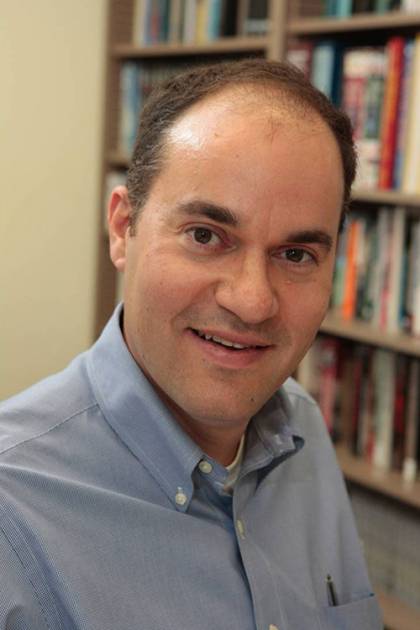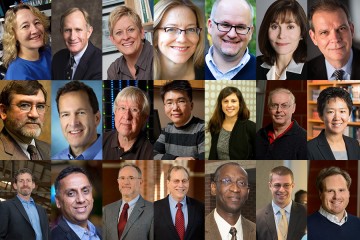As an urban economist, Matthew E. Kahn has found a way to blend two of his abiding passions: cities and data. For the past two decades, he's been a leading investigator of the causes and consequences of urban economic growth, whether in Chinese metropolises or Rust Belt cities.
"Cities fascinate me because the majority of people around the world now live in them, and they're our centers for social interaction, learning, and trading with each other," Kahn says. "But economists have long noted the challenges of high-density living—congestion, crime, and pollution—so to maximize the benefits of urbanization, we need to mitigate those quality-of-life challenges."

Image caption: Matthew Kahn
Image credit: University of Southern California
As of this summer, the economist's new home for research is Johns Hopkins University, where he's been appointed a Bloomberg Distinguished Professor of economics and business. Kahn will also serve as the new director of 21st Century Cities, the university's hub for urban research, education, and outreach.
"Dr. Kahn's prolific research on urban and environmental challenges has established him as one of the leading economists in the world," says Sunil Kumar, JHU provost and senior vice president for academic affairs. "I am delighted that he has chosen to bring his expertise of these critical issues to Johns Hopkins and lead 21CC in its innovative work on cities."
21CC supports the interdisciplinary examination of urban economic opportunity and quality of life. In its first five years, the initiative has conducted workshops and symposiums, written policy briefs, awarded seed grants, and fostered student research opportunities designed to address fundamental urban problems.
While 21CC works on solutions for cities around the globe, it pays special attention to issues affecting Baltimore. Going forward, Kahn says, "21CC will be working with community development experts and policymakers to identify new strategies for enhancing the vibrancies of our hometown."
Kahn also hopes to increase 21CC's focus on quantitative research and innovative data collection. He envisions strengthening collaboration with the data-centric Center for Government Excellence, or GovEx, which is part of JHU's new Centers for Civic Impact.
"21CC will leverage the urban big data revolution to study what works and what doesn't in promoting economic growth," Kahn says. "We'll crunch data to evaluate the intended and unintended consequences of different policies. We'll partner with key stakeholders to define performance metrics for measuring progress in addressing urban challenges."
For Kahn, the fascination with cities is not only a research interest but also a personal one.
He grew up in New York City in the early 1970s—"when it was a much rougher place than it is today," he says—and later witnessed the start of the revitalization of Chicago's South Side while earning his PhD in economics from the University of Chicago.
"In my life, I've witnessed several urban revivals," he says.
Kahn has held professorships at Columbia, Tufts, UCLA, and, most recently, the University of Southern California, where he chaired the Department of Economics. As a visiting professor, he has taught at Harvard, Stanford, and the National University of Singapore.
Throughout Kahn's career, a core idea has shaped his research: the significance of quality of life in cities as a driver of economic growth.
"High quality of life and vibrant amenities draw job seekers and new firms and create a strong tax base—which, in turn can be used to address a city's poverty challenges," he says. "With economic growth comes the possibility of financing the renovation of the older housing stock, and investing in pre-K programs for disadvantaged children to help them achieve their full potential as adults."
In recent years, Kahn has worked on measuring the carbon footprint of different cities and explored how urbanites and their cities are adapting to the threats of climate change—the topic of his upcoming book from Yale University Press. He sees a silver lining in the ways these challenges inspire cities to innovate.
"As we anticipate these risks, what new business opportunities does that create, what new products can we invent?" he wonders. "I'm optimistic about the role human ingenuity can play."
Kahn has authored four other books, including Green Cities: Urban Growth and the Environment and Blue Skies Over Beijing: Economic Growth and the Environment in China with Siqi Zheng of MIT. He has published more than 130 peer-reviewed papers on topics related to urban and environmental economics, including recent studies of how pollution affects the happiness of Chinese urbanites, and the role of bullet trains in connecting China's secondary cities to its megacities.
Kahn often co-authors papers with his wife, fellow economist Dora L. Costa. Their first paper studied the increasing propensity of highly educated "power couples" to move to major cities, and they co-authored the book Heroes and Cowards: The Social Face of War.
Kahn is also a research associate at the National Bureau of Economic Research and a research fellow at IZA. He serves as an associate editor of the Journal of Urban Economics and for PLOS One.
At Johns Hopkins, he will teach economics courses in the Carey Business School and the Krieger School of Arts and Sciences.
"Dr. Kahn's expertise will be well-matched with our students' eagerness to use data to solve seemingly intractable challenges, particularly those that affect people living in urban areas," says Beverly Wendland, dean of the Krieger School. "His work at Johns Hopkins will also help us enhance the already natural relationship between the business school and our economics students."
Added Bernard T. Ferrari, Carey's dean: "Matthew Kahn is a natural fit for the Carey Business School faculty because of his ability to explore the role that private capital can play in making our cities more vibrant and livable. We're excited to have him on our faculty, and we know he will contribute greatly to our mission of creating knowledge that benefits both business and society."
As the university's 42nd Bloomberg Distinguished Professor, Kahn takes his place among an interdisciplinary cohort of scholars at Hopkins working to address major world problems and teach the next generation. The program is backed by a $350 million gift from Michael R. Bloomberg, a Johns Hopkins alumnus, founder of Bloomberg LP and Bloomberg Philanthropies, World Health Organization Global Ambassador for Noncommunicable Diseases, UN Secretary-General's Special Envoy for Climate Action, and former New York City mayor.








